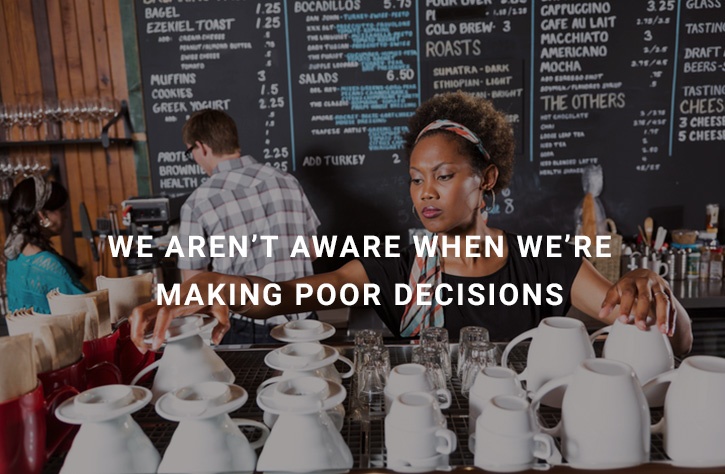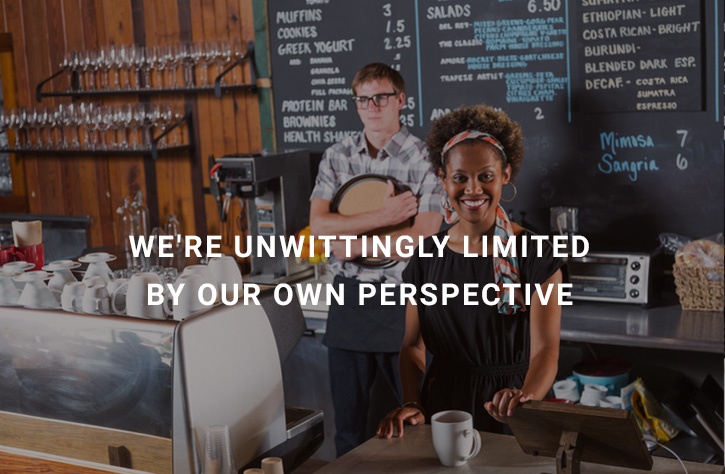
When we look at human behaviour from the outside in, we come up against a recurring problem: we don’t know what we don’t know.
That’s a simple way of saying we can’t see our own blind spots. Knowledge and weaknesses tend to be hidden from our conscious view, so we aren’t aware when we are making poor decisions in the first place, so it’s all the more difficult to correct them. Basically, we're limited by our own perspective.
That would be a difficult enough challenge to overcome, but a journey into our minds reveals something even tougher. Namely, that the more complexity there is to a situation, the more secure we feel in the accuracy of our thinking and decision-making.

View all of the posts in our Cognitive Biases in marketing series.
As the stakes get higher, we grow more and more certain that we are on the right path. That means when we are wrong, the price of our error or misinformation is that much higher.
In psychology, they call this phenomenon the hard-easy effect. It has been studied countless times, and refers to our tendency to be over confident in our ability to answer difficult questions, and under confident in our knowledge of simple matters.
There are thousands of business owners and executives out there who feel absolutely sure they understand the value of internal links within Google’s algorithm, for instance, but will hedge any answers they give about the basic role of keywords on a website.
They overestimate their ability to control or explain complex ideas, but also second-guess themselves on topics they should know.
The hard-easy effect can have large (and potentially damaging) consequences when it comes to making plans or putting budgets together. That’s because the more complex and expensive a campaign is, the more you have on the line… and the more likely you are to be sure your ideas will work.
At the same time, if you continually back away from the little things you know to be accurate, you avoid the kinds of nuts-and-bolts activities that make you successful.
Because hard-easy effect is more or less universal across all cultures and demographics, it’s something we can expect to see in ourselves and in others.
That means we have to monitor our own decision-making, but also to keep a close eye on the advisors or employees we trust. That’s not because they want to deceive us, but because they have internal biases just like we do.

Due to the way this particular form of cognitive dysfunction works, the best way to be on guard against it is to look at big decisions and large assumptions. When evaluating a certain projection or course of action, for instance, ask yourself the question: why am I so sure about this?
It’s also a good idea to project a little bit of healthy skepticism onto the information you get from other people. Evaluate their sources, consider their perspective, and look for the signs that you might be fooling yourself into thinking you are more knowledgeable or resolute than you are.
Our minds work like runaway trains more often than we might think. Once they grab hold of a specific idea or emotion, they’ll keep running forward unless we steer them in a different direction.
That’s not a bad thing when we are being enthusiastic and starting a new project; it can be disastrous, though, if we are operating from a false sense of confidence.
The other side of the hard-easy conundrum can be just as disastrous. When you convince yourself that you might not have enough information or insight when deep down you are sure your information is spot on, it can lead you to be reluctant when you should act.
There’s a fine line between being impulsive and just making a decision you have to stick with. If you want to be successful as a marketer and business leader, you have to learn the difference.
Perhaps the best way to deal with these types of situations is to have someone who can serve as a reliable sounding board. Ideally, this person will know your strengths and weaknesses, and be able to challenge or back you up accordingly.
When they catch you doubting yourself (because the decision seems too easy), they can remind you of your credentials. Conversely, when you’re storming ahead on assumptions that might not be valid, they can slow you down to ask critical questions.
Ultimately, a business person who doesn’t trust themselves with little things can’t get work done or move projects forward. In the same way that no one can afford to make big blunders because they were overconfident, they can’t run a company effectively if they are second-guessing every instinct, either.
The one thing that makes any psychological bias so damaging is that we aren’t generally aware we have them in the first place. By simply thinking about the hard-easy effect and the way it impacts your decision-making, you have a better chance at reversing its effects.
This particular quirk of human nature is interesting because it means we tend to get worse-than-expected results from big decisions, and better-than-expected outcomes from small ones.
I suppose you could say these contrasting notions cancel each other out, but I think they suggest we could always be smarter about evaluating what it is we do and don’t know.
Your internal filter makes it seem as if you know more than you do about difficult subjects, and less than you should about easy ones. Be aware of that and you can make everything about online marketing just a little bit more effective.
I hope you're motivated to comment or share this post with your connections. I've done a fair bit of research figuring out these biases in hopes of helping you figure them out as well.
- Randy
Topics: Digital Strategy, Applied Psychology, All Articles